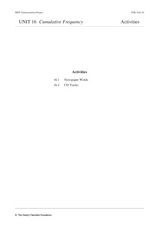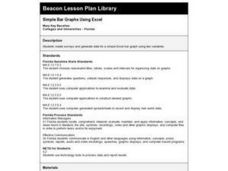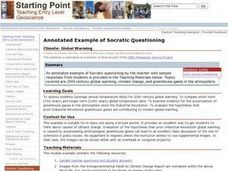Curated OER
Finding the Basal Area of a Forest Plot to Determine Stocking Levels
Learners use graphs and plots to measure the basal area and stocking levels. In this graphing instructional activity students work in the field the use their data to help them complete a lab activity.
Curated OER
Line Graphs and Commercial Costs
Students investigate line graphs. For this middle school mathematics lesson, students compare and contrast different types of graphs and create line graphs based on the data provided.
Curated OER
A Bar of Many Colors
Second graders use colored candies to collect data, construct double bar graphs, and find averages.
Curated OER
Sediment Deposition Lab
Learners set up a stream table, observe erosion, and record data on where various sizes of sediments settle. They draw conclusions as to what kind of sedimentary rock form in what locations.
Curated OER
Journal of the Stars
Students receive balloons representing the "Life Cycle of the Stars." As the attached script is read, students follow the directions for the color of balloon they are given. Students chart the results for their star. They plot data from...
Curated OER
Experimenting with Pressure and Volume
Students investigate temperature and pressure with simple laboratory equipment. They use a handheld with sensors and probes to study temperature and pressure. Students explore the nature of gases with respect to temperature and are able...
Curated OER
Weathering Rates
Students calculate weathering rates from tombstone weathering data. Atmospheric (and precipitation) chemistry determines the rate of weathering for marble tombstones. They are shown data from a rural and an unrban cemetery, and are...
Curated OER
Color Me Hot
Seventh graders use the scientific method, to observe, record and analyze the data they gathered. They make observations using their five senses. Students compare, contrast and draw conclusions based on the observations and data...
Curated OER
Internet Field Trip: Simple Machines
Learners observe and identify the types of simple machines. They conduct research and gather data to increase the comprehension of simple machines. Students identify and comprehend data to complete a graphic organizer and focus...
Curated OER
Cumulative Frequency
In these word frequency worksheets, students choose a page from a newspaper and count the number of letters in each word and complete their results in a table. Students then calculate the mean number of letters. Students then collect...
Curated OER
What Happened to the Mean and Median
Learners find the mean, median and mode. In hs statistics lesson, students collect, plot and analyze data. The identify the effect the central tendency have on the data and line.
Curated OER
Mean, Median and Mode
Students define mean, median, mode and outliers. In this statistics lesson, students analyze data using the central tendencies. They follow a path through a maze collecting data. They analyze the data using the mean, median and mode.
Curated OER
Simple Bar Graphs Using Excel
Students create original survey questions, and develop a bar graph of the data on paper. They input the survey data using two variables onto an Excel bar graph spreadsheet.
Curated OER
What Can You Learn From A Mealworm?
Students collect data from mealworms. For this science and math lesson plan, students gain an understanding of collecting metric data using mealworms.
Curated OER
The Normal Distribution
Students investigate normal distribution. In this statistical analysis lesson plan students investigate the variety of circumstances in which the normal distribution can be used. Students apply the normal distribution to solve problems.
Curated OER
Water Conservation
Students investigate water conservation. In this water conservation lesson, students list the uses for water and record their water usage for one day. Students graph the data and create a water conservation poster.
Curated OER
What's the Rub? It's All About Friction!
Students determine the coefficient of friction for different surfaces. In this physics lesson, students identify the factors that affect friction. They collect data and write a formal lab report.
Curated OER
Teaching about Increased Conductivity: Are Culverts The Culprits?
Students encounter the complexity of identifying the cause of unusual variations in WOW conductivity data. They propose theories on why there was a sudden increase in conductivity in Ice Lake, Minnesota during July of 1998.
Curated OER
Animal Trackers
Students use space technology to monitor migratory species, map their movements, and gather data about their habitats and possible responses to climatic shifts.
Curated OER
Let the Sunshine in
Students collect and analyze data to study wavelengths of visible light. They cover Styrofoam cups with three different colors of sun filtering products and shine a lamp directly on the cups. They determine the most effective filtering...
Curated OER
Personal Ecosystem
Young scholars build an aquatic ecosystem using large glass pickle jars. In this ecology lesson, students build and ecosystem then observe and collect data on the habitats. In this long term project young scholars observe a population...
Curated OER
How Do They Relate? Linear Relationship
Students collect information and use a line to represent it. In this algebra lesson, students investigate real world data to see if it makes a line. They graph the line comparing the relationship of the x axis with that of the y axis.
Curated OER
Take Only Photos and Leave Only Bubbles
Students make careful observations and record their observations. They communicate their findings with their peers and analyze data collected about a site. They determine what it means to be a looter, and feel the direct effects of...
Curated OER
Annotated Example of Socratic Questioning: Climate: Global Warming
Students compare and discuss short-term and longer-term global temperature data. They evaluate data from three sets of graphs and then participate in a structured whole class Socratic discussion on the possible causes of climate change.

























